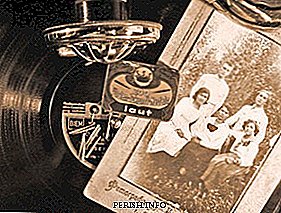 Already in 1919, the exodus of Russians from Russia began. The country has left several million people. Istanbul, Prague, Berlin, Paris and even Harbin were the centers of Russian scattering around the world. The first wave of emigration turned out to be extremely rich in talents. No wonder - in fact, in fact, almost the entire "silver age" emigrated.
Already in 1919, the exodus of Russians from Russia began. The country has left several million people. Istanbul, Prague, Berlin, Paris and even Harbin were the centers of Russian scattering around the world. The first wave of emigration turned out to be extremely rich in talents. No wonder - in fact, in fact, almost the entire "silver age" emigrated.
It is blasphemous to draw parallels between the fates of those who stayed and those who left - who, they say, was harder? Emigration is always a misfortune. Poet and critic G. Adamovich, reflecting on the psychology of emigration, came to the conclusion that the exile does not feel the people behind him, he is doomed to fill the resulting void with himself, alone.
It is gratifying that many had the spiritual potential and the "gold mines of nostalgia." Figures of the first wave perceived themselves as “foreign Russia”, they felt a vital connection with their left homeland. They were able to give even more than they expected.
"We left the Crimea ..."
Singers, musicians and composers, such as F. Shalyapin, S. Prokofiev, S. Rachmaninov, A. Vertinsky, P. Leshchenko, also turned out to be in exile. Thoughts and soul, of course, they remained there, in Russia, captured by the Bolsheviks and the communist utopia.
There are a large number of fakes under the so-called. "White Guard" song. Some are more talented, others less. But there are only a few real poems that have become songs that reflect the exodus of Russians from Russia.
The author of one of these poems - Cossack poet Nikolai Turoverov. The song itself was born much later, already in the post-Soviet period. The group "Lube" performs it under the name "My horse". Pay attention to the footage from the film "Two Comrades Were Served," which serve as a kind of illustration of the song:
"We are strangers to them - forever!"
Huge in emigration was the popularity of Alexander Vertinsky. The lack of voice was compensated by a peculiar manner of performance, flight of hands, and balancing. Poetess Raisa Bloch Vertinsky wrote a song to the poems of the poet Raisa Bloch Vertinsky who died in the Nazi concentration camp. "Other cities rustle here". This is the real and authentic Russian song in exile. It is as if saturated through and through with terrible nostalgia for Russia, that's why it was perceived keenly. Yes, and the genre Vertinsky chose a rather peculiar - this is a romance in the rhythm of tango:
Perhaps Vertinsky remained the best performer of the song, except for a very worthy modern interpretation of the actor A. Domogarov.
"Only the light does not let up sadness ..."
Another song, known for the performance of Alla Bayanova, Pyotr Leschenko, Kira Smirnova, - "I'm homesick ". Poems written at the very end of the Second World War. Their author - George Khrapak, the future Honored Artist of the RSFSR. It is ironic that the lines he created turned out to be so strikingly in tune with the emigrant nostalgia.
In Romania, Khrapak met with Peter Leshchenko, presented him with his text, composer Georges Ypsilanti picked up a melody, and the song "shot". Khrapak himself was awaited by the years of the Stalinist Gulag and the late rehabilitation. Unfortunately, the song was not preserved by Petr Leshchenko. Today, the song does not forget the "silver voice of Russia" - Oleg Pogudin:
All cranes fly and fly ...
No less paradoxical story occurred with a poem by one of the creators of the image of Kozma Prutkov, the poet Alexei Zhemchuzhnikov - "Cranes". It dates back to the year 1871. In the redesigned version, the verses became a song in the mid-1930s. Soloist "Jazz Tabachnikov" Nikolai Markov sang this song repeatedly, and in the Soviet Union it went like hot cakes thanks to flexible records "on the bones". Popular rumor stubbornly attributed the song to the same Petru Leschenko. There are "camp" and "yard" text alterations. The program "Ships entered our harbor" gave the song a second life in many ways.
"The heart is gone, but the memory is alive ..."
Few will say something to the name of Yuri Borisov. Meanwhile, one of the most piercing stylizations for emigre lyrics, for songs of the Russian diaspora, belongs to him. Song "Everything is now against us", like many works of a similar thematic series, it is written as if from a “common” name - there is no narrow-personality “I”, only “we”. The song is known in the performance of "bright boy" Maxim Troshin:
The poem by the completely prosperous Soviet poet Robert Rozhdestvensky can be considered a peculiar monument of Russian emigration. "Saint Genevieve de Bois Cemetery". Singer Alexander Malinin often performed a song on these verses in the early years of his popularity:
The author - Pavel Malofeev

Leave Your Comment